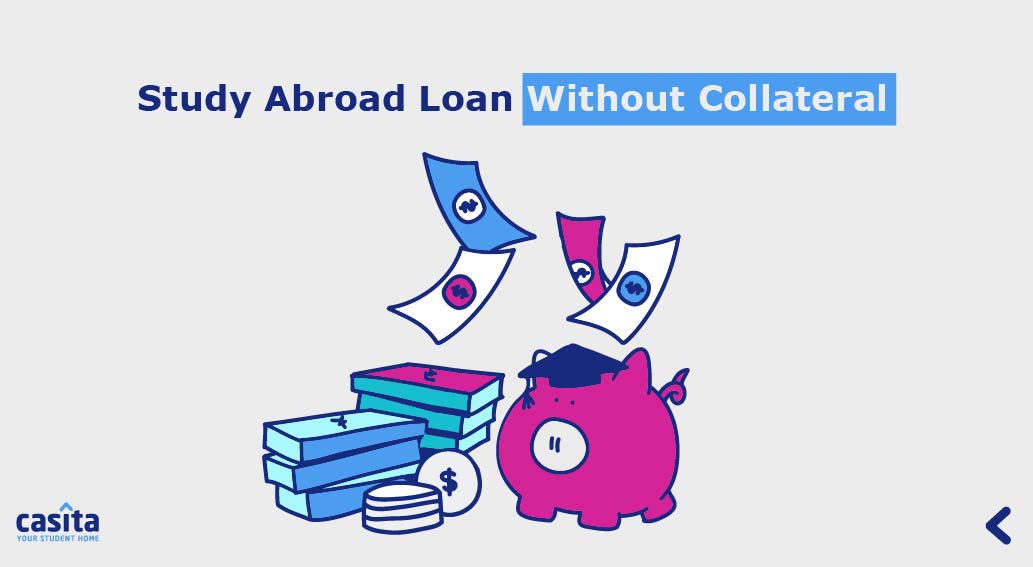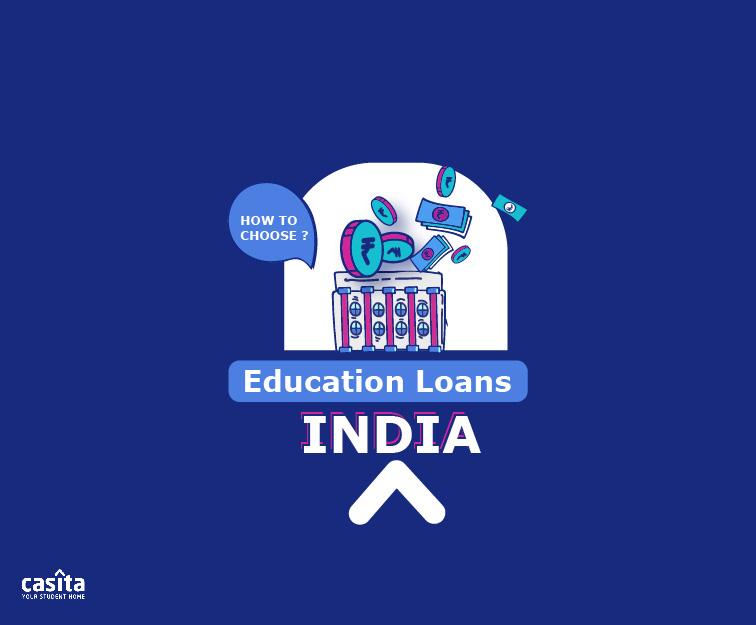How to Get a Study Abroad Loan Without Collateral?
Student Finance
5 mins read
Share

Updated at: 25 November, 2025
Published at: 05 June, 2023
By Guest Contributor
How to Get a Study Abroad Loan Without Collateral?
Student Finance
5 mins read

Updated at: 25 November, 2025
Published at: 05 June, 2023
By Guest Contributor
Share
Studying abroad can be a rewarding and enriching experience, but it can also be very expensive. Many students who want to pursue higher education in foreign countries need financial aid to cover their tuition fees, living expenses, travel costs and other expenses. However, not everyone is able to offer money or other assets as collateral for an education loan. If the borrower doesn't pay back the loan, the lender may be able to recover the collateral as security. Collateral may take the shape of stock, gold, fixed deposits, real estate, or other assets.
Fortunately, there are several choices for students who want to get an education loan without collateral for studying abroad. In the following paragraphs, we'll look at a few of these options and offer advice on how to apply for them.

What are the benefits of an education loan without collateral?
An education loan without collateral has a number of benefits over a loan with collateral. Among them are:
1. You are not required to use any of your personal or family assets as collateral for the loan. This reduces the stress and risk associated with taking out a loan.
2. You can get a higher loan amount compared to a loan with collateral. Generally, a loan without collateral can cover up to 100% of the total cost of your education abroad, whereas a loan with collateral may have a lower limit depending on the value of your collateral.
3. You can get a lower interest rate than a loan with collateral. The interest rate of a loan without collateral depends on various factors such as your academic performance, your course and university, your co-applicant's income and credit history, etc. Also, if you have a strong profile, you can get a reasonable interest rate that is comparable or even lower than a loan with collateral.
4. Compared to a loan with collateral, you can get a longer repayment time. A loan without collateral usually has a repayment time period that can extend up to 15 years after finishing your course, whereas a loan with collateral may have a shorter duration depending on the tenure of your collateral.
5. You can have more flexibility in applying for and repaying the loan. A loan without collateral does not require any evaluation or verification of your collateral, which saves time and effort. You can also choose from various repayment options such as moratorium period, prepayments, part-payments, etc.
What are the eligibility criteria for an education loan without collateral?
The eligibility criteria for an education loan without collateral may vary from lender to lender, but some of the common requirements are:
1. You must be an Indian citizen and above 18 years of age.
2. You must be accepted into an accredited course and university abroad. The course should be relevant to your career goals and offer high employment and income prospects.
3. You must have a strong academic record and a consistent performance in your previous examinations.
4. You must have a co-applicant who is either your parent, spouse, or sibling. The co-applicant must have a steady source of income as well as a strong credit history.
5. You must have a valid passport and visa for the country where you intend to study.
6. You must have all the necessary documents such as admission letter, fee structure, cost of living estimate, academic transcripts, income proof, tax returns, bank statements, etc.

How to apply for an education loan without collateral?
There are two main ways to get an education loan without collateral: banks and non-banking financial companies (NBFCs). Both have their own pros and cons, so you should compare them carefully before choosing one.
Banks
Banks are traditional lenders that offer education loans without collateral under various schemes, such as Central Scheme for Interest Subsidy (CSIS), Vidya Lakshmi Portal (VLP), etc. Some of the benefits of applying for an education loan from a bank are:
Being eligible for an interest rate discount through CSIS if you are a member of the economically disadvantaged or minority communities.
Applying online through VLP which is a single-window platform that connects you with multiple banks and provides information on various schemes and scholarships.
Getting tax benefits under Section 80E of the Income Tax Act on the interest paid on the loan.
However, there are some drawbacks for getting a bank education loan:
Facing delays and hassles in processing and disbursing the loan due to bureaucratic procedures and documentation.
Not getting the entire loan amount as banks usually have a margin requirement of 5% to 15% which means you must pay some part of the cost from your own pocket.
Certain courses and universities that are not recognized by banks or have low employability or income potential may not get you the approval for an education loan.
NBFCs
NBFCs are private lenders that offer education loans without collateral through online platforms or offline channels. Some of the benefits of applying for an education loan from an NBFC are:
Faster and easier loan approval and disbursement since NBFCs have less stringent criteria and more flexible processes than banks.
Customized solutions and personalized guidance from NBFCs as they cater to specific segments and needs of students.
Having access to various value-added services such as pre-visa disbursement, forex assistance, travel insurance, etc.
Some of the drawbacks of applying for an education loan from an NBFC are:
Paying a higher interest rate than banks, as NBFCs charge more risk premium for unsecured loans.
You may not get any subsidy or tax benefits on the interest rate, as NBFCs are not covered under CSIS or Section 80E.
Paying additional charges such as processing fee, late payment fee, foreclosure fee, etc.

Which website can help you find an education loan without collateral?
There are several websites that can help you find an education loan without collateral for studying abroad. Here is our recommendation for you:
ForeignAdmits
ForeignAdmits is a business-to-business digital platform, that offers a service of helping study abroad consultants to improve their students' post-admissions journey. It provides a variety of services and tools to assist students in their post-admissions journey.
A notable factor that ForeignAdmits has is its collaboration with various lenders, such as InCred Finance, Prodigy Finance, Auxilo Finserve, and 13 others, to provide education loans without collateral. These loans are available for students pursuing studies abroad and can cover expenses up to Rs. 2 crore.
To learn more about the education loan options and the benefits offered, you can visit ForeignAdmits.
Students are advised to try out Loan Tool and get instant pre-approval status for an education loan without collateral for studying abroad.
To conclude, an education loan without collateral is an alternative for students who desire to study abroad but do not have enough assets or income to provide security for the loan.
You can enjoy some advantages such as higher loan amount, lower interest rate, longer repayment period, and more flexibility and ease if you choose to get a loan without collateral. However, there may be some cons, such as higher risk premium, no subsidy or tax benefits, and additional charges than a loan with collateral.
Therefore, students should compare both options of getting an education loan without collateral: banks and NBFCs, and choose the one that best fits their profile and needs.
Student Finance
By Guest Contributor
Share
Student Finance
Updated at:
Published at:
By Guest Contributor
Share


